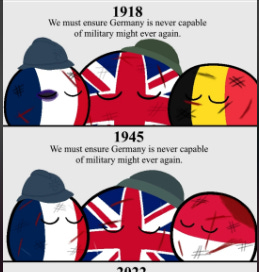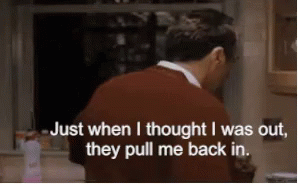Europe's Entitlement Bird Looking for a Place to Roost
it's the 21st Century, let's act like it
Since the mid-00s, regulars here have heard me say often my warning to my European NATO colleagues some variation of, “The USA is just one election from walking away from underwriting European defense.”
This came to acute attention during the Trump administration simply because he would say to their faces what I know was being told to them behind closed doors; the American public wants to regress to the mean. The Cold War was won three decades ago, we spent two decades on foolish adventures, and many of our NATO allies refuse to do the bare minimum to meet the security concerns on their own continent … waiting for a reluctant power from North America to save them from issues to the east and south that have been there for a thousand years.
America won’t leave you - but we would like to be just a back up.
That’s the executive summary for new readers. Others weigh in on this topic as well, and it was nice to see that our friend Emma Ashford last week pondered it a bit over on Substack in, Europe is Whistling Past the Graveyard on Defense.
She opens up being slightly perplexed that at the Halifax Security Forum stated that,
“The five U.S. Senators and one House member in Halifax, often holding private sessions with foreign officials in what their staff called the “command center,” said they didn’t hear any skepticism about American resolve behind closed doors.”
Well, that is not all that shocking given the general disconnect of many in DC from the people they represent, it also is something a smart Senator and House members don’t speak of too easily out of turn on foreign soil about.
Back for the Europeans though, as I know from personal experience, they vapor lock at the thought of Uncle Sam just, well, going home where we prefer to be.
Emma isn’t shocked either;
It doesn’t surprise me, though. During visits to several European countries in the last couple of months, I kept hearing similar sentiments. Foreign policy folks across the pond might agree that U.S. domestic politics is increasingly risky, but tend to argue that America will still able and willing to step up if needed. When asked about backup plans – the ways in which U.S. allies are hedging against the worst outcomes – they mostly demur.
A problem I had with most of the “foreign policy folks across the pond” that I worked with was their incredibly blinkered view of the USA, and specifically U.S. domestic politics.
Directly or indirectly their view of the USA comes from the Washington Post or the New York Times. If they have been to the USA, it is usually somewhere on the Acela Corridor or California. They have no idea not just how large the USA is, but how broad our domestic pollical scene is - and what is hard enough for Americans to understand is an undecipherable language to them.
That wouldn’t be a problem if they were self-aware of their lack of understanding, but it is just the opposite. There is a kind of aggressive weaponized ignorance that reminds me of the Norwegian Army Major who was very insistent that he understood race relations in the American South because, “I know your country. I spent a year at the U.S. Army Command and General Staff College at Fort Leavenworth, Kansas.”
You can see that blinkered view on great display on the domestic U.S. coverage of political issues in The Economist. It isn’t malignant, just ignorant.
It’s worth taking a step back to ask just why it is that Europe cannot get its act together on defense until the situation is truly dire. Perhaps, as some argue, Europeans are simply unwilling to commit the resources necessary to provide for their own defense, preferring to rely on Uncle Sucker? Perhaps some believe even in a post-Ukraine, post-Trump world that there is no need for a strong homegrown defense? Or perhaps, as Bob Kagan once infamously argued, it’s because Europeans are from Venus and Americans are from Mars?
I do have a bone to pick with Emma in the above, and others. They really need to separate this issue from Trump. I would caution that it predates him by almost two decades. He just adopted and already rising wave of discontent in both political parties as the discontent from the base of both parties grows each time someone decides every problem requires American lives and money borrowed in the name of children yet unborn.
Emma has six points, the first three I think are the most germane;
1. Smaller nations inside Europe – primarily those added to NATO since the end of the cold war – trust their Western European neighbors less than they do the United States, and fear abandonment in the case of a conflict.
…
2. Institutional and bureaucratic turf wars make it harder to figure out which institutions should be responsible for coordinating European defense. NATO and the European Union do not play as well together as one might assume,
…
3. There is no common “European” threat perception, and therefore no common European strategy.
Having tried to work with the EU’s military staff as a NATO officer … yeah … that ain’t going to happen. Almost a Blackadder meets Monty Python episode.
In her penultimate paragraph;
And even with newly found willpower and the prospect of losing the U.S. backstop to European defense, these problems will not be easily overcome. They help to explain why, even faced with the prospect of a second Trump presidency, many European foreign policy hands are still whistling past the graveyard on defense, hoping instead for a second Biden administration, and praying that they will have the time to construct European defense as a generational project, without too many costly political and economic choices.
Again, Trump is the least of Europe’s problems. It isn’t if the USA under Presidents of either party will leave NATO, no one wants to do that, it is just there is a non-zero number of Americans who would like an USA posture towards NATO be more in-line with our neighbor to the north, Canada.
Combined training and logistics bases? Sure.
Work on staff duty? Of course!
Rotate units in and out now and then? If one must.
Base large maneuver units on European soil and be the first to bleed? Notsomuch.
If you were European and you wanted a larger and more capable European defense, whom do you look to?
The UK and perhaps France are already spending 2%. Another medium sized nation, Poland, is pushing north of 3%, but they’re, well, Poles.
No, there is one place in Europe that has the population, GDP, and room to grow that can make the difference, and that nation is Germany.
Even if the German people and their politicians wanted to, could they? Even with the crystal clear proof as the Russo-Ukraine War kicked off almost two years ago … even if there is a will to the theory, I’m not sure there the fortitude for follow-through or even the capability.
As noted by Peter Carstens in F.A.Z.
Together with Chancellor Olaf Scholz, Pistorius carelessly promises NATO strong divisions that do not exist and is full-heartedly transferring a brigade to Lithuania that does not yet exist. The two percent commitment to the defense alliance is only achieved by the coalition itself with accounting tricks, billions in debt and cloudy promises for the future by declaring pensions for soldiers in the GDR People's Army, interest payments on the debt and the like as “defense expenditure”.
…
Since the Russian attack on Ukraine and Chancellor Scholz's turnaround speech, the situation of the armed forces has not gotten any better, but has continued to deteriorate rapidly. Tanks, artillery and hundreds of other vehicles were handed over to Ukraine from already depleted battalions. For good reasons. What's bad, however, is that almost none of it has been replaced.
…
The Bundeswehr only has around 50,000 assault rifles because no new G36s have been purchased for almost ten years for purely political reasons.
That great German economic machine? When you throw all your surplus in the maw of Vaal, well … Andrew Stuffaford reading FT noted yesterday;
Gunnar Groebler, who joined Germany’s second-largest steelmaker two years ago, told the Financial Times that if manufacturers of materials needed by industry, such as steel or chemicals, were to leave the region due to high energy costs “you run the risk of losing the whole value chain” of production.
His comments come as 32 per cent of surveyed industrial companies in August told the German Chamber of Commerce and Industry (DIHK) that they favoured investment abroad over domestic expansion — double the 16 per cent identified in the previous year’s survey — amid concern over a future without cheap Russian gas.
That survey is just the latest reminder of how destructive Angela Merkel’s “energy turnaround” (Energiewende) — ditching nuclear energy, ploughing billions into renewables, and relying on “cheap” Russian gas — has proved.
Just when Europe needs Germany to step up, she lacks not just the leadership to do so, but may not have the industry to do it even if she wanted to.
How much longer must the USA be the glue that holds “free” Europe together, or the force that keeps them from each other’s throats?






I agree that the Europeans have NO clue about the United States. Hell, the political classes in both the EU and the US have no clue about their own countries. I'm getting a definite "1848" vibe...that major political turmoil is in the wind. Time to get my rent-a-guillotine business started.
Having said that, three thoughts occur to me:
1. The center of gravity of NATO has shifted eastward. The former Warsaw Pact states are now the front line. This is a Good Thing, as they don't have the self-loathing of Western Europe.
2. Europe gets less from their defense Euro than they ought. European nations regard defense acquisition as an industrial subsidy, with weapons as a side-benefit.
3. If you really want the Americans to stay, think about paying them. A hundred billion Euro in the DOD budget would be mighty persuasive.
As long as politicians here and in Europe fritter away money on social programs for their increasing indolent and grabby constituents, nothing will get done because a politician's survival trumps everything else.